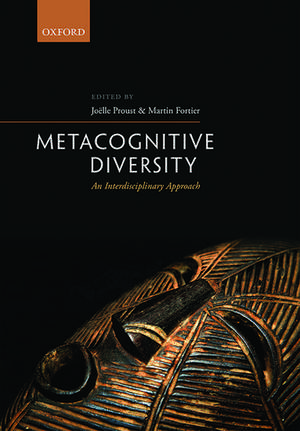Metacognitive Diversity: An Interdisciplinary Approach
Editat de Joëlle Proust, Martin Fortieren Limba Engleză Hardback – 5 apr 2018
Preț: 594.27 lei
Preț vechi: 786.69 lei
-24% Nou
Puncte Express: 891
Preț estimativ în valută:
113.73€ • 123.49$ • 95.53£
113.73€ • 123.49$ • 95.53£
Carte tipărită la comandă
Livrare economică 11-17 aprilie
Preluare comenzi: 021 569.72.76
Specificații
ISBN-13: 9780198789710
ISBN-10: 0198789718
Pagini: 456
Dimensiuni: 177 x 253 x 32 mm
Greutate: 0.94 kg
Editura: OUP OXFORD
Colecția OUP Oxford
Locul publicării:Oxford, United Kingdom
ISBN-10: 0198789718
Pagini: 456
Dimensiuni: 177 x 253 x 32 mm
Greutate: 0.94 kg
Editura: OUP OXFORD
Colecția OUP Oxford
Locul publicării:Oxford, United Kingdom
Recenzii
Joëlle Proust and Martin Fortiers 2018 edited volume, Metacognitive Diversity: An Interdisciplinary Approach, proves to be what it says on the tin, with an extensive collection of papers examining the cultural influences that produce diversity in metacognition and mind-reading. Metacognitive Diversity is an impressive work, as the advanced praise testifies in its early pages, many by well-known names in the field. But the praise is warranted, both in the content and in the execution of the book. The papers situate the reader in an overview of the tendrils of metacognition, and effectively show the reach and breadth that its influence is felt across different areas of our lives, from politics to cultural taste to religious practise, including reconciling conflicting or redundant explanatory sources of how we understand the world.
Notă biografică
Joëlle Proust is a French philosopher working at Institut Jean-Nicod, Ecole Normale Supérieure, Paris and Emeritus Director of Research at the Centre National de la Recherche Scientifique. She has conducted research at the CNRS since 1976 about the history and the philosophy of logic, the philosophy of human and animal cognition, agency, personal identity and metacognition. Thanks to an advanced grant by the European Research Council (2011-2016), Joëlle has conducted collaborative research with developmental psychologists, neuroscientists and cognitive anthropologists on the empirical and conceptual aspects of metacognitive diversity, in order to explore whether children and adults from Western Europe, Japan and non-industrialized Mesoamerican cultures differ in the ways they control and evaluate their own cognitive activity.Martin Fortier is a doctoral student at Institut Jean-Nicod, Ecole des Hautes Etudes en Sciences Sociales and Ecole Normale Supérieure, PSL Research University, Paris. Situated at the intersection of cognitive science, anthropology, and philosophy of mind, his research explores the interplay between cultural and neurobiological processes in hallucinogenic experiences-especially in the context of Amazonian shamanism-and animistic thinking, reasoning and categorization in Lowland South America. His fieldwork is located among Shipibo communities of the Ucayali River, Peru.
